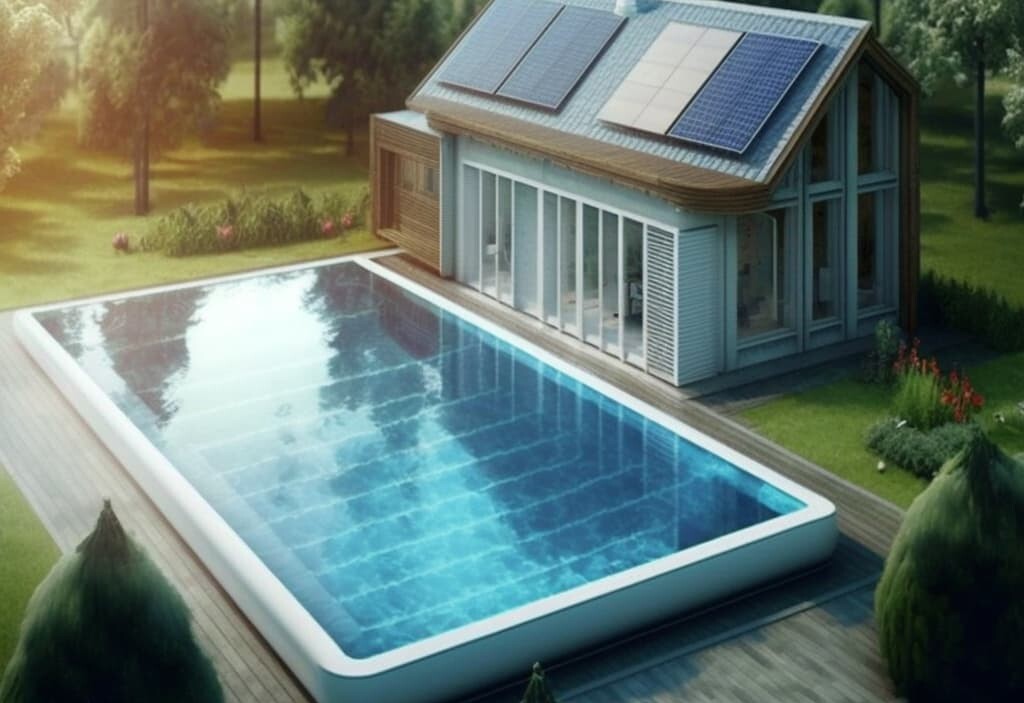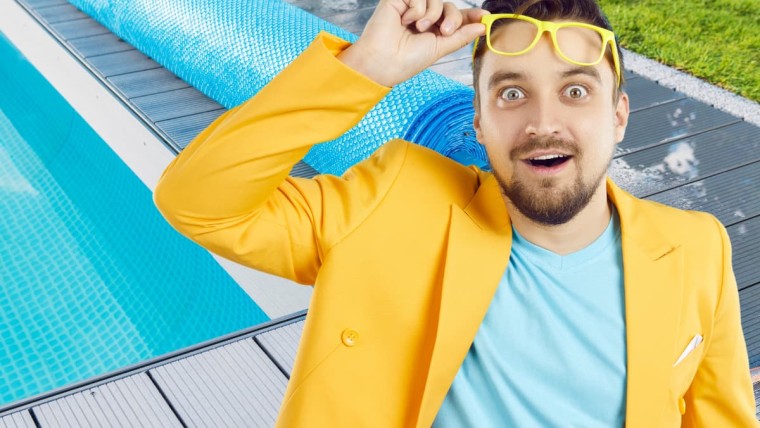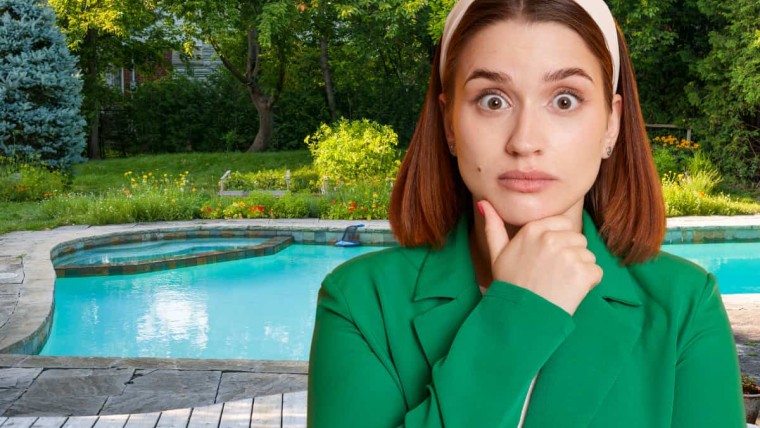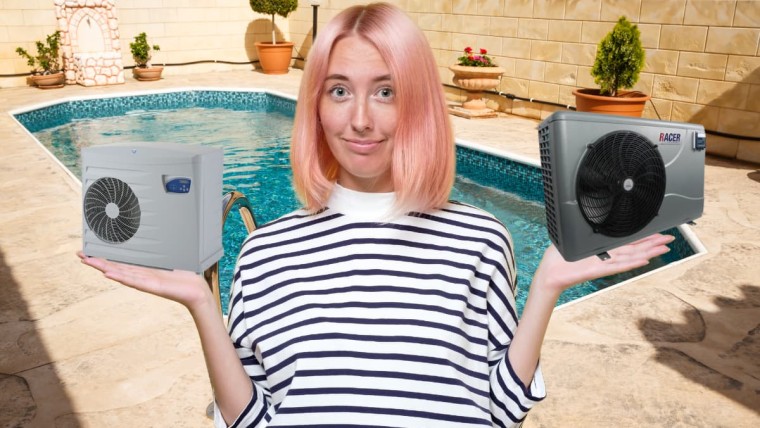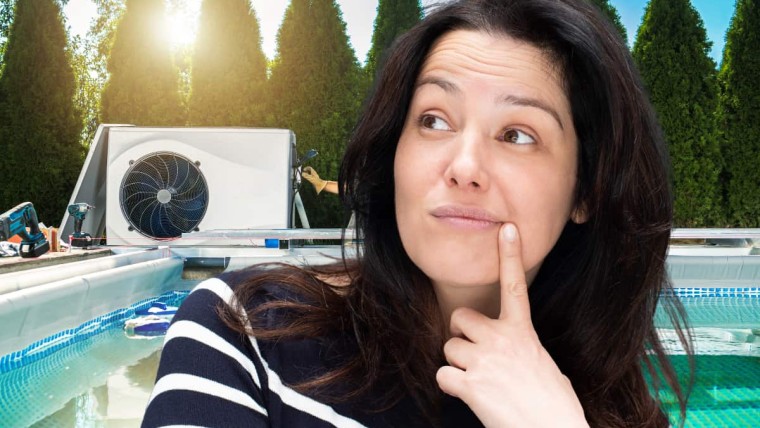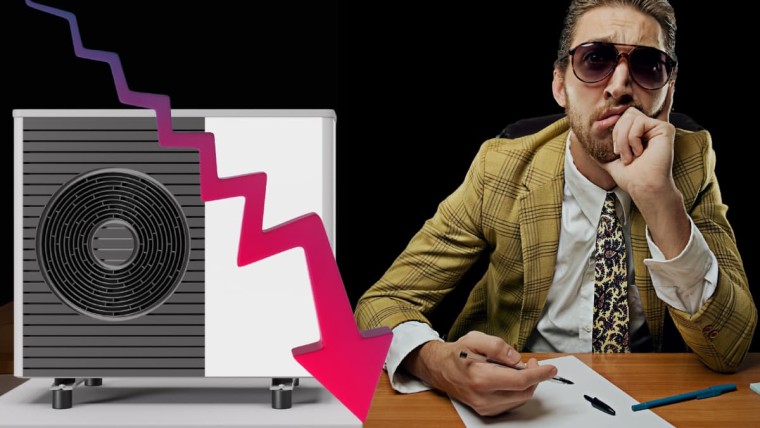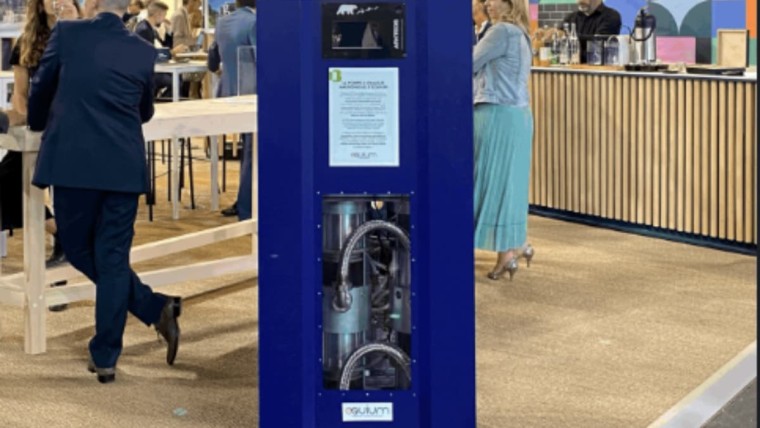If you are on this page, it is because you wish to equip yourself with an efficient and economical heat pump to fully enjoy your pool, even in relatively cold weather, and possibly cool the water in hot weather for maximum freshness. And you are right!
Pool heat pumps use the energy of the ambient air to soften the temperature of the water without increasing your energy bill. To help you make an informed choice, I offer you today a complete guide on pool heat pumps with the top 5 models, the best brands, practical advice, etc.
How does a pool heat pump work?
The swimming pool heat pump, or PAC piscine, is a heating equipment (generally of the "air-water" type) that uses the refrigeration process to transfer heat from the ambient air to the water of the swimming pool. The objective is to maintain a comfortable temperature of the pool water (heating it in autumn, winter and spring or cooling it during heat waves) while reducing energy costs and greenhouse gas emissions.
#1 The four elements of the pool heat pump
To take calories from the air and transfer them to the water of the pool, the pool heat pump uses a refrigerant that alternates between the liquid and gaseous state depending on the pressure, in a closed and sealed circuit. To heat the water in the pool, the heat pump uses four major elements:
- The evaporatorA heat exchanger that allows a liquid to be converted into a vapour or gas by taking heat from its surroundings. The liquid to be evaporated is heated, which allows the volatile part of the liquid to be vaporized;
- The compressorA mechanical device that compresses a gaseous fluid (air or refrigerant gas) to increase its pressure and temperature;
- The condenserA heat exchanger that transfers heat from a hot fluid (in the form of steam or gas) to a colder fluid (liquid or gas);
- The regulatorThis is a system for reducing the pressure and temperature of a refrigerant.
The performance of the swimming pool heat pump depends on the way these four elements work together. Let's look at the operating principle in detail.
#2 The stages of water heating by the pool heat pump
The cycle begins when the evaporator takes heat from the air and transfers it to the refrigerant (liquid). In swimming pool heat pumps, R410A or R32 is generally used. A quick comparison:
| R32 | R410A |
| PRG 675 | GWP 2087.5 |
| Pure gas | Mixture 50 % " R32 " + 50 % " R125 |
| Slightly flammable (A2L) | Not classified as flammable (A1) |
| Cheaper | More expensive |
| Slightly better performance | Slightly less efficient |
- Pushed into the evaporator by the fanThe liquid refrigerant captures the heat and becomes a gas;
- The newly formed gas flows into the compressor which increases its pressure and then its temperature, until it reaches 90°C. At the compressor outlet, the refrigerant is in a gaseous state, with a high pressure and temperature;
- It arrives in the condenserwhich is the key element of the pool heat pump. It is equipped with coils in which the hot refrigerant will circulate to heat the water of the nearby pool;
- As it heats the pool waterThe refrigerant gas cools and then returns to the liquid state. At the exit of the condenser, it is at room temperature, but still under high pressure;
- The regulator creates a low pressure environmentThis causes a significant cooling of the liquid, which returns to the evaporator to start a new cycle.
The "secret" to the attractive performance of heat pumps lies in their ability to transfer heat from a cold source to a hot source using a refrigerant. Unlike traditional heating systems that produce heat by burning fossil fuelsThe heat pump requires only a small amount of electricity to circulate the refrigerant in the refrigeration circuit.
Users' opinions on the pool heat pump
Users of pool heat pumps are generally positive about their efficiency and energy performance, although they cite some limitations that may be related to weather conditions or the difficulty of choosing the right model in some complex configurations.
Overall, those who choose a pool heat pump to heat their pool water appreciate :
- Energy savings In a complicated economic climate, users are unanimous about the savings on their energy bills from the heat pump (vs. traditional fossil fuel heating systems). With an average COP of between 5 and 7, swimming pool heat pumps consume 5 to 7 times less kilowatts than traditional heating systems. actually transmitted to the pond water. The users' opinions are positive: "energy savings", "reasonable electric bill", "good performance", etc.
- Efficiency Heat pumps are not de facto more efficient than traditional heating systems, all other things being equal. On the other hand, their efficiency is widely appreciated given the substantial energy savings they provide;
- Versatility Swimming pool heat pumps can be used to heat water in cooler weather, but also to cool water during heat waves. This use is rarer, but it does exist, especially in regions that experience abnormally long heat periods (Auvergne-Rhône-Alpes, Bourgogne-Franche-Comté and Occitanie, as shown in this Heatmap from Météo France) ;
- Sustainability Swimming pool heat pumps have a relatively long service life and require little maintenance: between 8 and 10 years. However, this is (much) less than a conventional air-to-water heat pump, which will last for about 20 years.
Users mention a few drawbacks, including:
- The initial investment. The cost of purchasing and installing a swimming pool heat pump can be higher than that of a traditional heating system, even if it is more economical in the long term. The investment is between 1,000 and 4,000 € for the purchase of the heat pump, to which must be added between 1,000 and 4,000 € for the installation, for a total cost of between 2,000 and 8,000 €. Please note: users are obviously not eligible for state aid for a heat pump intended solely for swimming pools.
- Dependence on weather conditions The performance of swimming pool heat pumps can be affected by weather conditions, especially extreme temperatures, high winds or precipitation;
- Slow heating. The heat pump is a slow heating system. It will take several days for the water in a pool located in a cold region to be fully heated after wintering, especially if it has not been covered;
- Noise level Without being outrageously loud, some pool heat pumps can produce audible operating noise, which can be an inconvenience for some users, especially if they suffer from a form of misophonia or aversion to light but constant noise;
- Aesthetics Not all pool heat pumps are aesthetically pleasing and/or compact. However, some brands do better than others (Poolex and Majestic, for example, make good-looking heat pumps).
Top 5 best pool heat pump models on the market
#1 Poolex Silverline 70 Full Inverter (FI) pool heat pump
[all4affiliates id="3241″ title="Silverline FI Full Inverter Pool Heat Pump "]Available in 5 power levels to heat pools from 30 to 110 m3The FI Silverline pool heat pump is a bestseller on the market.
We present here the model 70 (7 kW) capable of heating pools up to 45 m3 which has the following advantages and disadvantages:
- Full Inverter Technology (FI): the heat pump adjusts its consumption to the real needs of the pool with a control of the compressor - fan couple to the nearest percent;
- FI technology allows a good COP between 4.6 and 6.4 for Air 15° C / Water 26° C ;
- The Silverline FI uses R32 refrigerantThis is more economical, less polluting and slightly more efficient than R410A;
- It is a (very) quiet heat pumpIt produces only 19 to 34 db(A) at ten meters depending on the regime;
- The Poolex Silverline has a quality compressor on board (Toshiba);
- It is a reversible heat pumpwhich can cool the water in hot weather;
- It is remotely controllable via mobile application;
- Flat Aesthetically, the Silverline 70 FI from Poolex is a plain one. It looks like any other outdoor unit of a heat pump or a conventional air conditioner.
#2 Poolex Silverline 70 pool heat pump
[all4affiliates id="3239″ title="POOLEX POOLSTAR Silverline 70″]This is a classic pool heat pump, in On/Off mode, which does not include Full Inverter technology. This entry-level model with a power of 7 kW will reasonably heat a small pool of less than 35 m3with a good COP of 5 in Air 15° C and 26° C.
Like the Silverline FI, this model uses R32 refrigerant and is equipped with a Toshiba compressor. This heat pump is delivered with an isothermal winter cover, anti-vibration pads, PVC connectors Ø 50 mm, a condensate drain kit and a wired control extension (10 m). We appreciate the remote control by Wifi, not always proposed on this price range.
If the quality-price ratio is interesting (it is one of the most popular models for small pools), some disadvantages are to be noted:
- The noise level is acceptable, but it is higher than on the previous model. We are on 49 db(A) at 10 meters, that is to say the equivalent of a "quiet" conversation;
- The aesthetics are even less neat than on the Silverline FI. Of course, the anti-corrosion and anti-UV metal shell is solid, but it does not give a flattering aspect to the PAC ;
- The Silverline 70 pool heat pump is not reversible. Therefore, it will not cool the water in case of hot temperatures.
#3 The Racer Inverter Pool Heat Pump
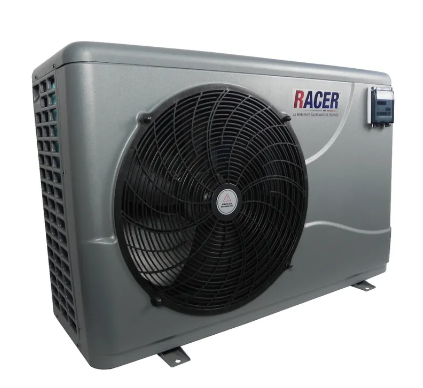
The Racer brand belongs to Cash Piscines, a company with more than 100 stores specializing in swimming pool equipment in France and Spain. Its Inverter model is widely distributed in France and Western Europe, thanks to its good value for money. This heat pump is available in 7 powers, from 7 kW to 25 kW, for pools of 12 m3 at 132 m3.
Let's start with the downside of this model: the aesthetics. As we explained in our guide to Racer's PACs, this brand does not seem to focus on the design of its products. We are very far from the sleek look of a Majestic X-Ter or a Poolex Vertigo Full Inverter. So don't expect the Racer Inverter to add any aesthetic value to your exterior. Another small drawback to note: this model is not compact. The dimensions are indeed larger than average. The 7 kW model is 1008 x 370 x 577.
Racer's Inverter model, however, has several strengths to offer:
- A phenomenal COP, which reaches 8.6 on Air 28° C and water 28° C. For less advantageous conditions (air 15° C and water 26° C), the COP remains interesting, since it oscillates between 4.1 and 5.6. In short, you consume between 4 and 8 times less than the kW delivered to the pool to heat the water;
- Without being silent, the Racer Inverter heat pump is not very noisy, generating between 37 db(A) and 48 db(A) depending on the model (at 10 meters). This is equivalent to the noise of a quiet restaurant or a modern dishwasher nearby.
- This model can be controlled remotely, via the Alsavo Pro mobile application;
- You can set the start and stop time to 24 hours.
#4 Zodiac Z200 M4 pool heat pump (11.5 kW)
[all4affiliates id="3243″ title="Zodiac Pompe à Chaleur Piscine Z200 MD4, "]See our review of the Zodiac heat pump
The Zodiac Z200, also known as the Zodiac Power or Everpac, is an entry-level model available in 4 power ratings:
- The Zodiac Z200 M2, with a power of 6.7 kW ;
- The Zodiac Z200 M3, with a power of 9.3 kW ;
- The Zodiac Z200 M4 (presented here), with a power of 11.5 kW ;
- The Zodiac Z200 M5, with a power of 14.8 kW for pools with a maximum volume of 70 m3.
The Z200 M4 heat pump has a good COP of 5.1 in high summer (air 28° C and water 28° C), and a correct COP of 4 in the low season. The manufacturer explains that this model can efficiently heat pools with a maximum volume of 60 m3... but we recommend it for pools of 30 to 40 m3. An update on its benefits :
- A price below the market average for this range;
- An all-encompassing design, with some nice ribs and finishes (except for the color, which we'll talk about below);
- This heat pump uses R32 refrigerant gas, which is more economical, less polluting and slightly more efficient than R410A;
- The noise level is acceptable, ranging from 38 to 41 dB(A) at 10 meters, which is in compliance with current regulations.
As for the disadvantages, we will mention the COP which remains correct without more and the color of the device (off-white) which does not honor its rather successful design.
#5 Thermor Aeromax 2 pool heat pump
See our review of the Thermor pool heat pump
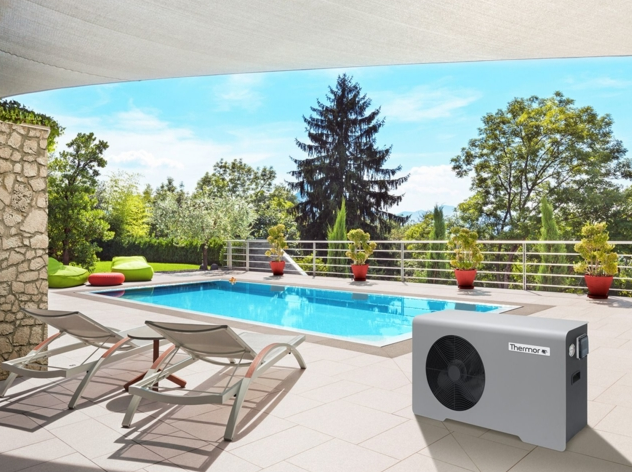
Thermor is a brand of the French group Atlantic. Its range of swimming pool heat pumps includes only one model, the Aeromax 2, offered in 4 powers:
- Aeromax Piscine 2 - 8kW, for pools up to 50 m3 ;
- Aeromax Piscine 2 - 10 kW, for pools up to 65 m3 ;
- Aeromax Piscine 2 - 12 kW, for pools up to 75 m3 ;
- Aeromax Piscine 2 - 14 kW, for pools up to 90 m3.
Let's see the advantages of this Thermor model:
- A COP that is in line with the market average, estimated at 4.39 for Air 15° C - Water 26° C, and at 5.32 for Air 24° C - Water 26° C ;
- Without being a fashion statement, the Aeromax 2 has a pleasant design, with a beautiful grained grey, a "Thermor" logo inlaid on a silver plate and a galvanized steel body for a sober and minimalist look;
- This heat pump has a titanium heat exchanger which avoids corrosion, especially in salt disinfected pools (electrolyser);
- This Thermor model uses R32 refrigerant gas;
- It is one of the quietest heat pumps in its class, generating just 33 dB(A) at 10 meters, the equivalent of a bedroom at night;
- The control panel interface is intuitive.
On the downside:
- Thermor has missed the digital turn, since this heat pump can not be controlled via smartphone;
- The Aeromax 2 is rather bulky, with dimensions above the market average (1,057 x 347 x 620 for the 8 kW model);
- Prices above the market average, starting at €2,544.80 including tax for the 8 kW model.
Choosing your pool heat pump: selection criteria
To correctly choose a pool heat pump, several criteria must be taken into account, which we list below, with some comments:
The pool heat exchanger It is a room in which two hydraulic circuits meet in order to allow the calories to pass from one to the other. The first circuit contains the water of the pool, the second contains the water heated by the pool heat pump. Titanium heat exchangers are often preferred because they are the most resistant, especially if you have a very corrosive pool water (sea water for example) or if you use a corrosive disinfectant for cleaning. For the standard case, steel heat exchangers will do.
Climate or weather conditions: Indeed, the more extreme the latter are (a lot of wind, altitude), the higher the power of the heat pump must be. In this regard, you must calculate the heating power according to these criteria, as well as the dimensional data of your pool.
Defrosting Defrosting: All machines today have a defrosting system to prevent the evaporator from freezing. This can happen when the outside temperatures are low but positive, then the evaporation temperature goes below zero and the evaporator freezes. It is then necessary to stop the refrigerating circuit while continuing to ventilate the air above 0, which makes it possible to melt the ice slowly but surely. Another more technical method is to reverse the refrigeration cycle and transform the evaporator into a condenser in which condensation will take place, which is a reaction that releases heat and will then melt the ice.
The choice of refrigerant R410A or R32, today these are the main choices. If you want to know more about their differences, we have explained all the differences, advantages and disadvantages, in this article.
Acoustics Depending on the location of the machine, you should consider how far away it is from your own living quarters, or those of the nearest neighbors, so as not to disturb anyone, and moreover to comply with the noise law in your area. To get an idea of the noise generated, try asking to visit a customer's installation by your installer, and you may be able to see the noise during the start-up of the machine when it starts to heat up.
The COP It may be interesting to look at this data, but mainly in comparison with other models, in order to estimate whether this or that model may be more interesting in economic terms. In absolute terms, the COP is always quite high for these machines, as the temperatures involved are often quite high. Hot air in summer. On the contrary of heating heat pumps for which the COP can sometimes be very low in winter and lead to higher electrical consumption.
The power of the heat pump: to estimate this power, you need to call on an installer who will make the calculations for you, following a visit to your installation. You can also refer to pool heating power calculators such as on this page as an indication to have an idea of model to be installed and thus of budget.
The price of the pool heat pump: of course the budget always counts. The prices vary most often between a few hundred euros and a few thousand euros. More details in the next paragraph.
The price of a pool heat pump
Apart from brand awareness, the price of a pool heat pump is determined by several objective factors:
- The power of the heat pumpThe power of the heat pump, expressed in kW, determines the amount of thermal energy the heat pump can produce. The larger the pool, the more powerful the heat pump must be, which can increase the cost;
- Coefficient of Performance (COP): The COP is the ratio of the amount of energy produced by the heat pump to the electrical energy it consumes. The higher the COP, the more efficient the heat pump is and the less electrical energy it consumes, which can reduce operating costs. Swimming pool heat pumps with a higher COP are necessarily more expensive, but they are less expensive to operate;
- Type of compressor Pool heat pumps can have reciprocating, screw or scroll compressors. Scroll compressors are the most efficient and quiet, but they are more expensive;
- Type of condenser Pool heat pumps can be equipped with titanium or copper condensers. Titanium condensers are more resistant to corrosion and more durable. They are therefore more expensive;
- Connectivity Some pool heat pumps can be equipped with WiFi or Bluetooth connectivity to allow remote control from a smartphone or tablet. Heat pumps with this feature may have a higher price tag;
- Installation costs Installation costs depend on factors such as the location of the heat pump, the complexity of the installation, the need for additional electrical or plumbing work, etc. ;
- Defrosting capacity Defrosting: Pool heat pumps sometimes need to defrost their evaporators to maintain their efficiency. Heat pumps with automatic defrosting capability may cost more;
- The noise level Noise: Pool heat pumps produce noise during operation. Models with reinforced sound insulation may be more expensive.
Here are indicative price ranges for different types of pools (without installation):
- For an above ground poolThe price of a heat pump generally varies between 500 and 2,000 euros;
- For an inground poolThe price of a heat pump can vary from 2,000 to 5,000 euros, depending on the size of the pool and the power of the pump;
- For large pools or with higher heating requirements, the price of a heat pump can exceed 5,000 euros.
These price ranges are indicative and can vary considerably depending on several factors such as geographic region, level of complexity of the installation, brand, technology, etc. It is therefore recommended that you get a personalized quote to get an accurate estimate of the cost of a heat pump for your pool.
You can install your pool heat pump yourself if you are a bit of a do-it-yourselfer, but we recommend that you have a qualified professional installer do it for several reasons:
- The professional installer has the technical knowledge to install a pool heat pump correctly and safely;
- He also has the experience to handle plumbing, electrical connections and ductwork installation;
- Professional installers often offer warranties and insurance on their work;
- They know the applicable standards and ensure that the installation of the pool heat pump complies with local and national regulations;
- A professional installer can optimize the pool heat pump installation to maximize its energy efficiency, which can save you money on your energy bills in the long run.
Advantages and disadvantages of a pool heat pump
Overall, the advantages of heat pumps far outweigh their few disadvantages. Let's start with the positive points of this equipment that will allow you to enjoy your pool longer:
- Energy efficiency: pool heat pumps use outside air to produce heat, which reduces operating costs;
- Constant temperature: good pool heat pumps are able to maintain a constant water temperature, which extends the swimming season;
- Low environmental impact: Pool heat pumps are more environmentally friendly than other pool heating options because they use outdoor air as an energy source rather than fossil fuels;
- Versatility: Pool heat pumps can be used in a variety of pool types, both above-ground and in-ground, and can be used in a variety of climates, although their performance and efficiency will vary depending on the conditions;
- Low noise level: overall, swimming pool heat pumps are not very noisy, rarely exceeding 50 db(A) at 10 meters;
- Lifetime: pool heat pumps are generally designed to last a long time (around 10 years);
- Safety: as they do not use fossil fuels, heat pumps do not present a risk of fire or explosion.
As for the disadvantages:
- High initial cost: As explained above, pool heat pumps can be more expensive to purchase than other heating options, with a price tag that can be well over €5,000 for larger pools. However, this investment is offset by long-term savings in operating costs;
- The purchase of a heat pump exclusively used to heat the water of your pool does not give you access to state aid;
- Dependence on weather conditions: pool heat pumps are less efficient in cold or wet weather;
- Space requirements: pool heat pumps often require additional space for installation, which can be a disadvantage if space is limited;
- Maintenance: Pool heat pumps require regular maintenance to operate optimally and maintain their energy efficiency. This may include regular cleaning of filters, inspection of electrical components and lubrication of moving parts.
- The price of the installation is high, sometimes exceeding 2 000 €.
Consumption of a pool heat pump
Heating your pool to be able to enjoy it longer during the year is a certain luxury. This luxury is paid for, of course, through the electricity that you will spend to keep the pool water pleasantly warm.
What is the average consumption for a pool heat pump?
It is generally accepted as a good approximation that the pool heat pump will cost you approximately between 3 and 4€ per m3 of water in your pool, per year. The average annual consumption of a 30m3 pool heat pump will thus be between 90 and 120€ per year, but of course this depends on many criteria that we will see below
How to calculate the electrical consumption of a pool heat pump?
The formula is relatively simple. All you need to do is to know the following elements and multiply them:
- Power of the heat pump in kW
- Number of operating hours per day
- Number of days of use in the year
- Price per kWh in the region with your electricity supplier
The number of hours of operation per day depends on the temperature you want for your water. It is generally 27 or 28°C if you want to be reasonable. And if you are looking for great comfort, you can go above 30°C. This number of hours also depends on the weather conditions in the case of an outdoor pool.
The number of days of operation depends on your desire to use the pool at certain times of the year.
These data are determined during the basic study carried out by the pool heat pump installer, or by the supplier of this heat pump, who is often more knowledgeable than the installer in making the correct theoretical calculations. The installers often work on the basis of experience, and know approximately what power is needed at a glance. Although more and more suppliers provide increasingly sophisticated means to make theoretical calculations in a few minutes, and thus optimize the power and the budget for the purchase of the pool heat pump.
What water temperature can be reached with a pool heat pump?
It is possible to heat up the pool water as much as you like from the basic temperature at which it is naturally found. Often customers choose a temperature of 27/28°C, which is still pleasant even if you don't move too much in the water. For those who swim or do sports in the pool, 25°C may be sufficient. For those who are looking for great comfort, it is possible to reach 30°C or more, by sizing the pool heat pump accordingly, and by accepting to pay the electricity bill.
On average, it takes a few degrees of heating per day, so the heat pump will have to run continuously for several days before the desired temperature is reached.
The best heat pumps according to the volume of the pool
The volume of the pool determines the power of the heat pump to be considered:
- For above ground pools up to 20 m3 A heat pump with a power of 3 to 4 kW will do the trick;
- For inground pools up to 30 m3 : a heat pump with a power of 5 to 6 kW is recommended;
- For inground pools up to 50 m3 : a heat pump with a power of 7 to 9 kW is required;
- For in-ground pools up to 100 m3 Choose a 12 to 15 kW model.
Here are some recommendations depending on the volume of your pool:
- Pond of less than 25 m3 You can choose the Zodiac Power Pac, the Poolex Nano Action or the Majestic Full Inverter of 6 kW;
- Pond of less than 30 m3 We recommend the Hayward EnergyLine Pro, the Zodiac ZS500 or the Silverline 70 from Poolex;
- Pool of less than 40 m3 the Full Inverter model from Majestic (10 kW), the Aeromax 2 from Thermor (8 or 10 kW) or
- Pool of less than 50 m3 These include the Silverline Full Inverter (7 kW) from Poolex, the Zodiac Z200 M2 and the X-Ter from Majestic (10 kW single-phase model);
- Pool less than 60 m3 The Zodiac Z300 M3, the Jetline Selection by Poolex and the Hayward EnergyLine Pro;
- Pools of less than 60 m3 These include the 22 kW Silverline model, the three-phase X-Ter from Majestic and the Silverline Pro Poolex.
Best PACs for above ground pools
What is an above ground pool?
As its name suggests, the above ground pool is neither in-ground nor buried. Instead, it sits on the ground or on a platform designed for that purpose. They are usually made of lightweight materials such as vinyl or plastic, and are often smaller than in-ground pools.
Above ground pools are generally collapsible and easily transportable, making them ideal for homeowners who want a temporary pool or who have limited space in their backyard. Above ground pool heat pumps are logically more compact, less powerful and less expensive than in ground pool heat pumps which are more powerful but also more cumbersome, difficult to install and more expensive.
Top 5 heat pumps for above ground pools
#1 The Mini heat pump for above ground pools
Designed for above ground pools of less than 20 m3This On/Off heat pump is available in three powers: 2.5, 4.2 and 5.5 kW. This model uses R32 refrigerant gas, which is slightly more powerful and less polluting than R410A, and operates from 12°C. In summary:
- COP : 4.2 (Air 28° C - Water 28° C), which drops to 3.4 for Air 15° C - Water 26° C, which is disappointing but logical for a small heat pump for above ground pool;
- Approximately 48 dB(A) at 10 meters, within the acceptable range;
- Does not start below 12°C;
- Dimensions: 340 x 365 x 379.
#2 The Poolex Nano Heat Pump
This model is designed for above ground pools and small inground pools of less than 20 m3 :
- The Poolex Nano is available in power ratings from 3 to 6 kW;
- Its COP is 5.5 at 15°C, which means it is very energy efficient and economical. You consume 5.5 less than the kW delivered to the pool to heat the water;
- The Nano heat pump is environmentally friendly thanks to the use of the environmentally friendly refrigerant R32;
- The Poolex Nano features a digital control screen with an intuitive user interface, making it easy to program and control the temperature of the pool water;
- It is a reversible heat pump. It can therefore cool the water in case of scorching temperatures.
#3 Poolex Jetblack Mini Heat Pump
The Jetblack Mini from Poolex has a 3.5 kW meter. It can therefore heat above ground pools of less than 21 m3. Here's what you need to know about this model released in 2022:
- Embeds a reliable and efficient Toshiba compressor;
- High performance R32 refrigerant gas;
- COP in 26/26 conditions: 5.4, which is excellent. For each unit of electrical energy consumed by the heat pump, it produces 5.4 units of thermal energy to heat the pool water. In less advantageous conditions (air 15° C - water 26° C), the COP falls to 4.55, which is still reasonable;
- The exchanger is equipped with titanium coils, which are resistant to corrosion and guarantee a good durability;
- The noise level of the JetBlack Mini heat pump is 48 dB at a distance of 10 meters, which is still reasonable and complies with regulations.
#4 Penguin Above Ground Pool Heat Pump
This is a playful heat pump with a fun design that is off the beaten track. In the shape of a penguin, this heat pump has a nice technical record despite its somewhat childish appearance:
- Available in three power ratings, to heat pools of 15 m3, 20 m3 and 25 m3 (this last model is reversible);
- COP of 5 for Air 27° C and Water 26° C, and of 4 for Air 15° C and Water 26°c, that is to say in the high average of the heat pumps for above ground pools;
- Acoustic power at 36 db(A)... it is therefore an almost silent heat pump;
- LED display and control by mobile application and/or Bluetooth;
- Operating range: from 10 to 43° C ;
- Titanium exchanger to protect the heat pump from corrosion.
A nice little heat pump that will please children with its fun design, but also parents for its great performance and energy savings.
#5 Hot Water Pool Heat Pump from Bestway
The Bestway Hot Water heat pump has a heating capacity of 4 kW for heating above-ground pools of less than 20 m3with a COP of 4.7 at an outdoor temperature of 26°C and a pool water temperature of 26°C.
This model has a rotary compressor for optimal energy efficiency and a titanium exchanger that protects the heat pump from corrosion. This model shines by its compactness (290 x 310 x 370) and its mini weight (15 kg). Beware, however, of the sound power, which reaches 55 db(A) at 10 meters, or as much as a dishwasher running at one meter.
Top 10 brands of pool heat pumps
Poolex

It is a relatively new French brand (2006) that offers mid- and high-end heat pumps for above-ground and in-ground pools, with rotary compressors, titanium exchangers, a wide range of power ratings and WiFi connectivity for remote control of the heat pump. Poolex's flagship models are the Silverline Pro and Jetline ranges. Poolex is part of the Poolstar group, which specializes in wellness equipment and material for pools and spas.
Racer

This brand is owned by Cash Piscines, a company with more than 100 stores in France and Spain, specializing in pool equipment. Its flagship models are the classic Racer heat pump and the Racer Inverter heat pump;
Mini

As its name suggests, this brand, which is carried by Cash Piscines, offers compact and silent models for small in-ground and above-ground pools. Its flagship product remains the eponymous model (Mini Eco);
Bestway

It is a Chinese brand created in 1994 in Shanghai that offers PAC models for above-ground pools and small in-ground pools. Thanks to its quality-price ratio, Bestway is now the world leader in the outdoor leisure market, with a market share of 35 %. Its flagship models are the Hot Splash, Hot Water and Sunspring ranges.
Zodiac

This French brand specialized in swimming pool equipment is best known for the Zodiac Power and Zodiac Z200 heat pumps;
O'Pool

It is a French brand that offers models for above-ground and in-ground pools. Its flagship models are the O'Pool Inverter and the O'Pool Silvertouch ;
Thermor

Thermor is a brand of the French group Atlantic founded in 1931 by the Maure brothers. It is best known for its Aeromax 2 range;
Onda

Onda is a Spanish brand specialized in the manufacture of pool heat pumps. The brand offers a wide range of models for above-ground and in-ground pools, with heating capacities from 5 kW. Onda heat pumps are equipped with scroll compressors and titanium exchangers, and some models are equipped with advanced features (intelligent controllers, automatic defrosting, remote diagnosis, etc.). Its flagship models are the Onda Inverter and Onda Mini;
Penguin

Penguin is a French brand that offers heat pumps with a fun design and rather interesting technical features. The brand's flagship models are the Penguin Mini and the Penguin Inverter;
Mazda Pool

Founded by General Electric in 1909, Mazda has used its expertise in energy exploitation to develop a brand dedicated to pool heat pumps. Its flagship models are the Mazda Series, Maza Design and Mazda Original lines.

Reda T.
Reda holds a PhD in finance and specializes in renewable energy economics. He combines financial expertise with an interest in sustainability, writing not only on the financing of green projects, but also on more general topics and frequently asked questions in this field.
